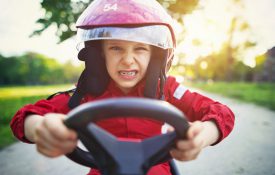-
The Problems with Poor Ballot Design
Scientific American: Tensions are mounting as we hurtle towards Election Day this Tuesday, yet with all the focus on who’s voting and where, most of us have put little thought into another essential part of the election process: the voting ballot itself. There are significant issues with the mechanics of voting, including the design of ballots and instructions for using them. Philip Kortum is a psychology professor at Rice University who studies how people interact with voting systems in real-world settings.
-
Social Science Says: Go Vote!
NPR: Millions of Americans will cast a vote for the next president of the United States on Nov. 8 — Election Day — and for countless other offices and propositions. In case you need the extra encouragement, here are three (more) reasons to vote, courtesy of the social sciences: 1. Voting is rational. (Maybe.) In fact, there are heated debates over whether it's rational to vote. On the one hand, voting is effortful: There is time and energy involved. And on the other hand, the odds that your individual vote will make a difference to the outcome of an election are miniscule.
-

Some Cognitive Skills Are Easier to Train Later
Older adolescents and adults can learn certain thinking skills, including non-verbal reasoning, more effectively than younger people.
-

Is Your Steering Wheel in Safe Hands?
Changes to the way drivers’ position their hands on the steering wheel may be a useful proxy for detecting perceptions of risk and cognitive demand.
-
The psychology of insiders and outsiders can explain why we have such a hard time agreeing on reality
Quartz: On Oct. 19, an estimated 70 million Americans tuned in for the final presidential debate between Hillary Clinton and Donald Trump. In theory, voters watching the debates should experience a common version of reality: everyone is hearing the same words, spoken by the same people. Whereas the New York Times and Fox News may report on the presidential campaign quite differently, watching a debate offers an unfiltered version of each candidate in real time. Yet when Republicans and Democrats watch the exact same event, they somehow walk away with radically different conclusions about what just happened. This is because people do not see the world objectively.
-
Don’t Look Now! How Your Devices Hurt Your Productivity
NPR: I'll admit it. I even take my phone with me when I head to the restroom, to fire off a few texts. Or I'll scroll through my email when I leave the office for lunch. My eyes are often glued to my phone from the moment I wake up, but I often reach the end of my days wondering what I've accomplished. My productivity mystery was solved after reading The Distracted Mind: Ancient Brains in a High Tech World, by Dr. Adam Gazzaley, a neuroscientist at the University of California, San Francisco, and Larry Rosen, a research psychologist and professor emeritus at California State University, Dominguez Hills.

